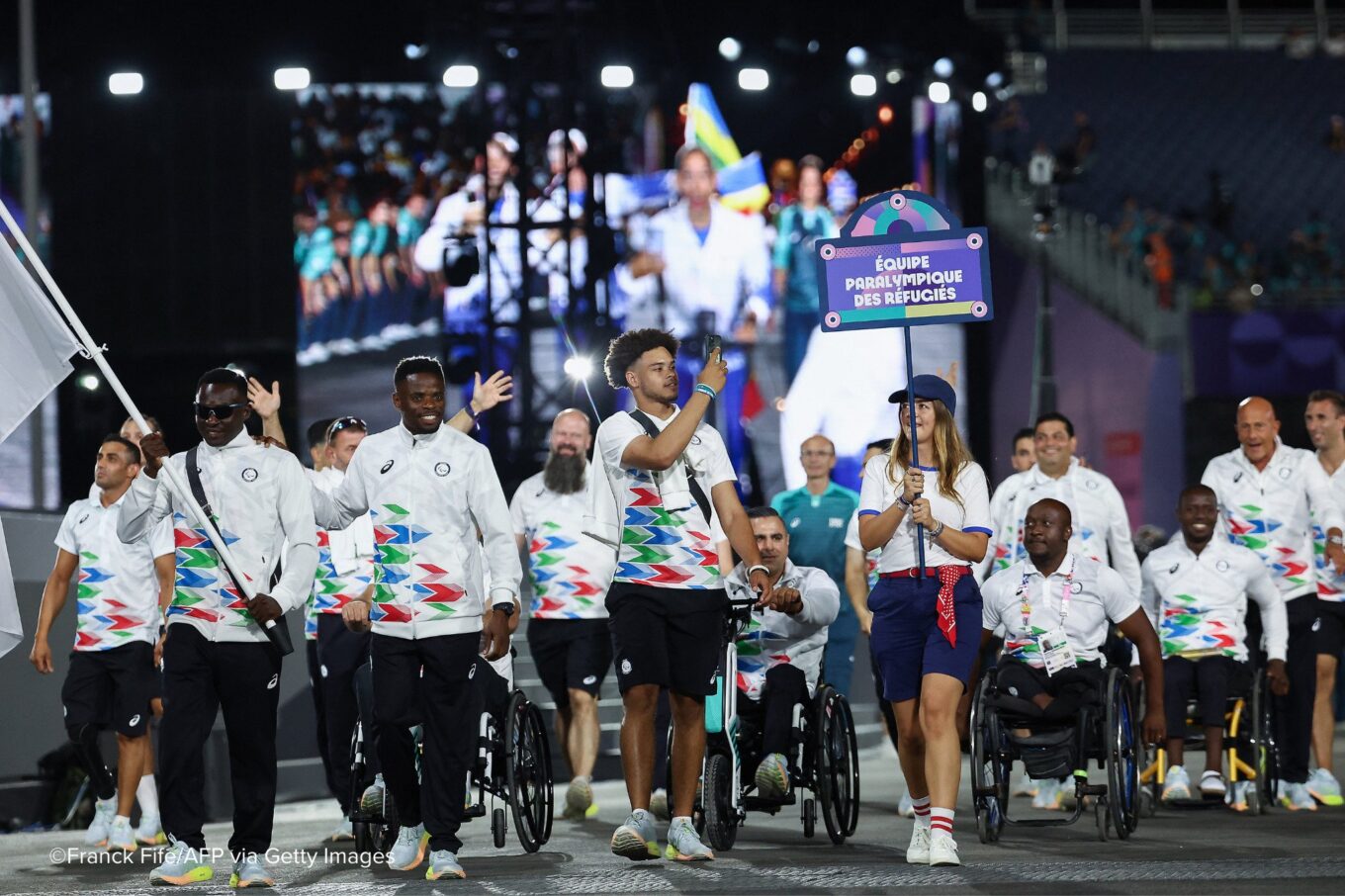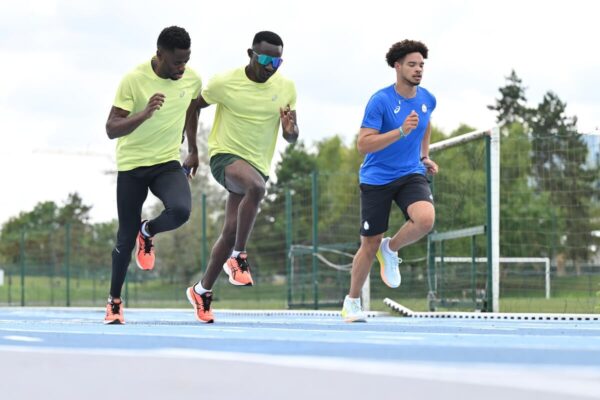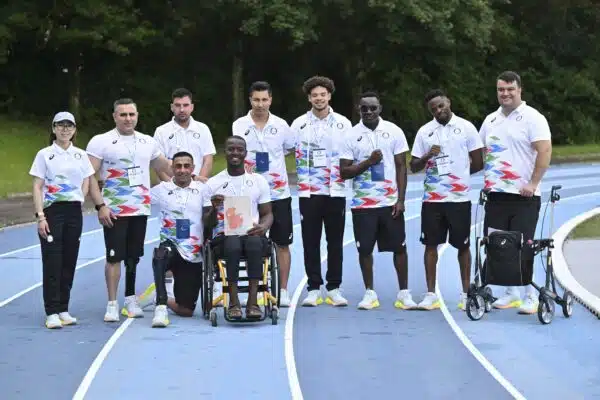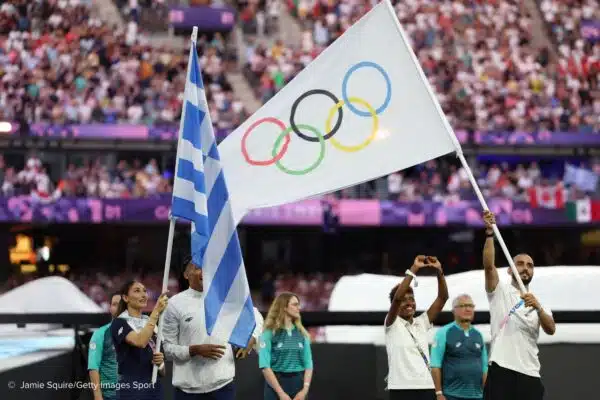
The Refugee Paralympic Team enters the Place de la Concorde during the Opening Ceremony of the Paris 2024 Paralympic Games. © Franck Fife/AFP via Getty Images
After overcoming huge adversity to reach the Paralympics, the team of refugee athletes now aims to compete, win and give hope to others.
By UNHCR staff
Members of the largest-ever Refugee Paralympic Team received a rousing ovation as they joined the procession of thousands of athletes along the Champs-Élysées and into Paris’ iconic Place de la Concorde on Wednesday, during the Opening Ceremony to mark the start of the Paris 2024 Paralympic Games.
Tens of thousands of spectators thronged the streets to cheer on the 4,400 athletes, including Refugee Paralympic Team flagbearer and T11 Para athletics sprinter Guillaume Junior Atangana.
“This Refugee Paralympic Team is one of the great stories of the Paris 2024 Paralympics,” said Andrew Parsons, President of the International Paralympic Committee. “Each of these athletes has overcome tremendous odds to get here and has a compelling message to share with the world. They are all great sports champions.”
UN High Commissioner for Refugees Filippo Grandi said: “The Refugee Paralympic Team is an inspiration to us all. These incredible athletes have overcome unimaginable adversity to achieve the highest pinnacle of sporting success.”
The eight refugee athletes are based in six countries and represent more than 120 million people forcibly displaced worldwide because of war, conflict, violence and human rights violations. This includes at least 18 million people with disabilities, who face higher risks of violence, discrimination, exploitation and abuse, as well as barriers in accessing critical support, assistance, education, sporting and livelihood opportunities.
“The Refugee Paralympic Team’s presence on the global stage sends a message of hope to millions of refugees across the world, and indeed to all of us. This remarkable team reminds us of how important it is for people with disabilities to have the chance to fully participate in society on an equal basis,” said Grandi.
This is the third time the Refugee Paralympic Team will compete at the Games. The first team, comprised of two refugee athletes, competed at the Rio 2016 Paralympics Games. The team grew to six for Tokyo 2020 and in Paris, the eight refugee athletes and two guide runners will compete in six of the 22 sports – Para athletics, Para powerlifting, Para table tennis, Para taekwondo, Para triathlon, and wheelchair fencing.
The first refugee athlete to compete on day one will be Para taekwondo star Zakia Khudadadi, the European champion in 2023 in the 47kg division. Khudadadi, who now lives in France, is an advocate for the rights of women around the world and made headlines after a harrowing escape from her country just days before Tokyo 2020.
“This team is made up of athletes, each with a different story,” Khudadadi said. “Being a part of this team is a privilege, and my goal is to show how strong women can be and to inspire other girls and women to pursue sports and aim for the Games.”
Also in Para taekwondo, Hadi Hassanzada, is hoping to emulate Khudadadi’s remarkable success when he competes in the men’s 80kg division in his first Games.
Flagbearer and Para athletics sprinter Atangana finished fourth in the 400m T11 at the Tokyo 2020 Paralympics, just missing out on a medal. At Wednesday’s Opening Ceremony, Atangana carried the Paralympic flag alongside his guide in the T11 400m and fellow refugee, Donard Ndim Nyamjua. Atangana will also compete in the T11 100m event in Paris.
Ibrahim Al Hussein is competing in his third successive Paralympic Games, but in his first Para triathlon after previously competing in Para swimming.
Salman Abbariki is making his refugee team debut in the Para athletics shot put, a sport in which he competed previously before becoming a refugee, in London 2012 and in the Asian Para Games in 2010 where he won gold and broke the Asian record.
Hadi Darvish is competing in Para powerlifting, following his bronze medal success in the men’s up to 80kg event at the Tbilisi 2024 World Cup in June, while in Para table tennis, Sayed Amir Hossein Hosseini Pour is hoping to build on his success after he won two gold medals at the Asian Youth Para Games 2021 in Bahrain.
In Wheelchair fencing, Amelio Castro Grueso also hopes to repeat earlier success after winning bronze in the Men’s Epee Category B at the 2024 Wheelchair Fencing Americas Championship in Brazil in May.
The Refugee Paralympic Team hopes to follow in the footsteps of the Refugee Olympic Team which enjoyed historic success at Paris 2024, winning its first-ever medal. “We’ve gone through a lot, but we’re here to win. We won’t give up,” said Khudadadi.
UNHCR, the UN Refugee Agency, is partnering with the International Paralympic Committee (IPC), the International Olympic Committee and the Olympic Refuge Foundation to support refugees at the Olympics and Paralympics Games in Paris.
Originally published by UNHCR on 29 August 2024.





